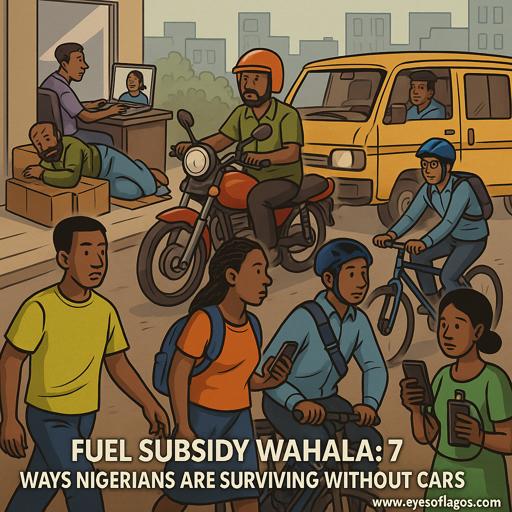Fuel Subsidy Removal: 7 Ingenious Ways Nigerians Are Surviving the Hardship

When President Bola Ahmed Tinubu declared “fuel subsidy is gone” on May 29, 2023, few Nigerians fully grasped the financial shockwave that would follow. Within hours, fuel prices soared from ₦185 per litre to over ₦800, forcing many to abandon their vehicles and search for alternative means to navigate daily life.
But in true Nigerian fashion, resilience and ingenuity have taken center stage. From increased walking to embracing electric mobility, Nigerians are finding creative — and often humorous — ways to adapt.
Here are seven notable ways Nigerians are surviving the fuel subsidy removal:
1. The Trekking Revolution: ‘Subsidy Cardio’ Goes Viral
With transport costs rising, many urban dwellers have taken to walking long distances daily. What started as a necessity has now become a form of fitness.
“I used to drive from Jakande to Lekki Phase 1. Now I walk part of the journey, and my jeans fit better,” says Nkem, a makeup artist in Lagos.
A survey by SBM Intelligence revealed that 38% of urban Nigerians now walk more frequently to cut transportation expenses.
2. Okadas and Kekes Replace Ride-Hailing Apps
As Uber and Bolt fares become unaffordable for many, Nigerians are returning to motorcycles (okadas) and tricycles (kekes) for quicker, cheaper movement — even if it means squeezing three people onto one bike during rush hour.
3. Office Sleepovers Become Cost-Saving Strategy
To avoid the daily transportation burden, some workers are opting to sleep at the office. In sectors like tech and banking, employers have reportedly provided mats and basic amenities for staff who now go home only on weekends.
“I only go home on weekends. It saves me ₦14,000 weekly,” says Uzo, a financial analyst based in Victoria Island.
A Channels TV report estimates that transportation now consumes up to 50% of some Lagosians’ monthly income.
4. Remote Work Gains New Popularity
The fuel crisis has accelerated the shift to remote work, especially in startups, NGOs, and even religious institutions.
“Fuel subsidy killed our physical Monday devotions. Now we pray on WhatsApp voice note,” says Lekan, a church administrator.
Zoom, WhatsApp, and Telegram have effectively become digital offices across the country.
5. Electric Scooters and Bicycles Gain Traction
Electric mobility is emerging as a trendy alternative, particularly in Lagos and Abuja. Young professionals now use electric scooters and bikes for short commutes, cutting fuel costs entirely.
“I plug it at night, ride to work in the morning. I’ve not bought petrol in three weeks,” says Tope, a software developer in Yaba.
Brands like Solar Taxi and MAX.ng are expanding their footprint in Nigeria’s e-mobility sector.
6. Transport WhatsApp Groups Build Community
In cities like Lagos, WhatsApp has become a tool for daily ride coordination. Residents from areas such as Isolo, Berger, and Surulere have created groups to share danfos, kekes, and even private car rides.
“It’s not just about saving money — it’s vibes and survival,” says Joy, a human resource executive in Surulere.
7. Charging Gadgets at Work Becomes Norm
With irregular power supply and longer hours spent outside the home, people now carry portable power banks religiously. Others opt to charge all devices — from phones to mini-fans — at their workplaces.
“Fuel is gold. If NEPA takes light, I wait till I get to the office to charge anything,” says Mustapha, a graphic designer.
Conclusion: Nigerian Resilience in Action
The removal of fuel subsidies has undoubtedly reshaped daily life in Nigeria, but it has also showcased the nation’s remarkable adaptability. From trekking to remote work, and electric scooters to ride-sharing communities, Nigerians are once again proving that Naija no dey carry last.
Are you also finding creative ways to cope with the subsidy era? Share your survival story — because in Nigeria, even hardship can’t stop the hustle.



